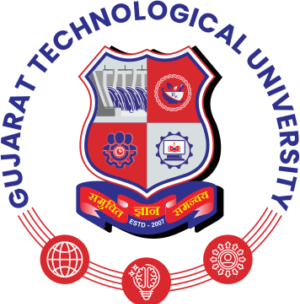Computer engineering is one of the most emerging and fastest developing discipline in the world. It consists computer programming, hardware or software development, and internet-based technology integration and applications for real world challenges. Computer subject knowledge plays an essential and vital role in the contemporary landscape of society, as the ceaseless progression and continuous amalgamation of technology infiltrate every facet of our day-to-day existence.
Computer engineers are competent enough with knowledge of all the latest and advanced technology regarding with machine and super computer. The major technical field associate with computer engineering is Artificial Intelligence, Design Automation, and Computer software, Embedded Systems, Cybersecurity, Networking and Database Handling.
Technological advancement and upgradation is associated with the computer engineers with key and important role. In the recent world of artificial intelligence, computer is most important and demanding field. These professionals design, build, maintain, and upgrade computer hardware, software, and networks. They provide innovative, practical solutions to technology and business problems.
Computer Engineers can contribute into various fields such as web designing and development, computer support specialist, computer systems analyst, computer system designer, database administrator, network administrator and much more.
GTU-GSET Computer Department is always committed to support students for giving cutting edge technology knowledge. Department is helping student to get competency in the recent era by exposure of industry demanding technology via expert session, short term training program, internship, training and industrial visits. Institute is also equipped with state of art infrastructure and prominent laboratory like high performance super computer, VAPT, internet of things, block chain and networking.
Program Outcomes
- Engineering knowledge: Apply the knowledge of mathematics, science, engineering fundamentals, and an engineering specialization to the solution of complex engineering problems.
- Problem analysis: Identify, formulate, review research literature, and analyze complex engineering problems reaching substantiated conclusions using the first principles of mathematics, natural sciences, and engineering sciences.
- Design/development of solutions: Design solutions for complex engineering problems and design system components or processes that meet the specified needs with appropriate consideration for public health and safety, and cultural, societal, and environmental considerations.
- Conduct investigations of complex problems: Use research-based knowledge and research methods including design of experiments, analysis and interpretation of data, and synthesis of the information to provide valid conclusions.
- Modern tool usage: Create, select, and apply appropriate techniques, resources, and modern engineering and IT tools including prediction and modeling to complex engineering activities with an understanding of the limitations.
- The engineer and society: Apply reasoning informed by the contextual knowledge to assess societal, health, safety, legal and cultural issues and the consequent responsibilities relevant to the professional engineering practice.
- Environment and sustainability: Understand the impact of the professional engineering solutions in societal and environmental contexts, and demonstrate the knowledge of, and need for sustainable development.
- Ethics: Apply ethical principles and commit to professional ethics and responsibilities and norms of the engineering practice.
- Individual and team work: Function effectively as an individual, and as a member or leader in diverse teams, and in multidisciplinary settings.
- Communication: Communicate effectively on complex engineering activities with the engineering community and with society at large, such as, being able to comprehend and write effective reports and design documentation, make effective presentations, and give and receive clear instructions
- Project management and finance: Demonstrate knowledge and understanding of the engineering and management principles and apply these to one’s own work, as a member and leader in a team, to manage projects and in multidisciplinary environments.
- Life-long learning: Recognize the need for, and have the preparation and ability to engage in independent and life-long learning in the broadest context of technological change.
Program Specific Outcomes
Computer Engineering students at the end of the program,- Should be able to understand the fundamental and advance concepts of computer engineering and their applications in the field of hardware and software development industries and other relevant areas.
- Should have the ability to apply technical knowledge, skill and usage of modern hardware & software tools related to Computer engineering for solving real-world problems.
- Should have the capability to analyze, comprehend, design & develop software solutions for a variety of engineering applications and thus demonstrating professional ethics & concern for societal well-being.
Program Educational Objectives
- An ability to identify, formulate, and solve complex engineering problems by applying principles of computer engineering, science, and mathematics in the field of study
- Ability to apply software/hardware design principles to develop software/hardware solutions to meet the need of the field of work in the domain study.
- Ability to cope with rapid technological changes in the field of computer engineering.
- An ability to recognize ethical and professional responsibilities in engineering situations in global, economic, environmental, and societal contexts
- An ability to obtain excellence in the field of computer engineering by pursuing higher education qualifications or able to get entrepreneurial skills in the field of study.
Computer Engineering Laboratory:
Computer labs are fully equipped with current software resources including open-source programming SDKs. The lab is used for the course subjects like C, C++ programming, Python Programming, Data Structure, Networking etc.
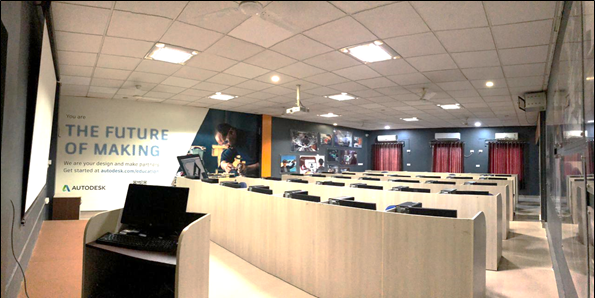
Computing Environment
The Department has well-equipped laboratories with computer systems for postgraduate and undergraduate students. All blocks in the campus are connected via a fiber-optic cable network to provide high-speed LAN as well as wireless connectivity.These laboratories are used by students for carrying out various academic activities. The laboratories also cater to the infrastructure requirements in order to host various student-centric events like internships, workshops, seminars, expert talks, etc.
Specialized Labs
The Department has several well-established specialized laboratories. These laboratories provide to carry out co-curricular and extra-curricular research activities.
Specialized Labs
The Department has well-furnished specialized laboratories with the latest amenities for the needs of students belonging to diversified programs.
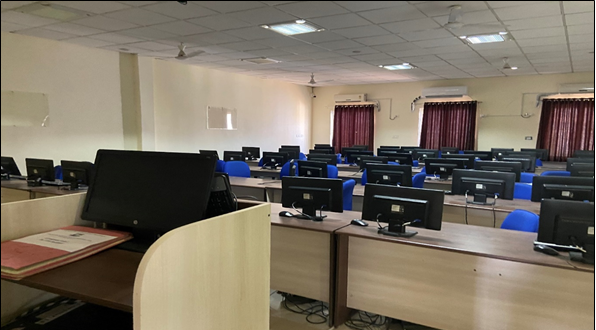
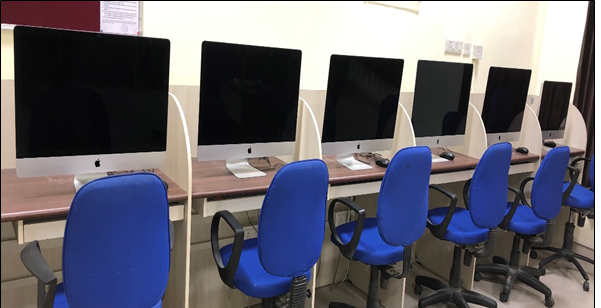
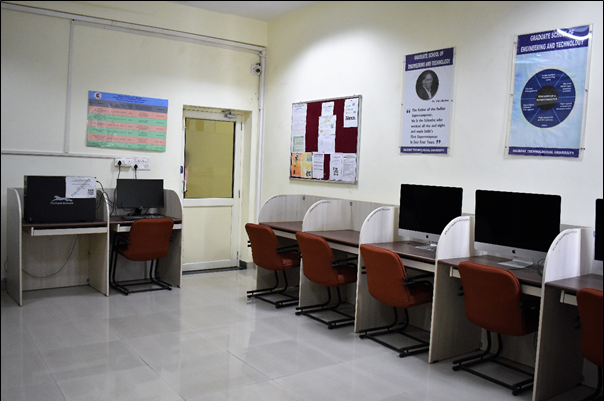
ESE (E) = University Theory Exam (External)
ESE (V) = University Practical Exam (Viva)
PA (M) = Progression Assessment (Mid Semester Exam)
PA (I) = Progression Assessment (Internal Continuous Evaluation -Practical/Term Work)
| Subject code and Category | Subject Name | Semester | Theory Hours | Tutorial Hours | Practical Hours | Credit | ESE (E) Marks | PA (M) Marks | ESE (V) Marks | PA (I) Marks | Total Marks |
|---|---|---|---|---|---|---|---|---|---|---|---|
| 3110002 Humanities and Social Science | English | 1 & 2 | 2 | 0 | 2 | 3 | 70 | 30 | 30 | 20 | 150 |
| 3110003 Engineering Science | Programming for Problem-Solving | 1 & 2 | 3 | 0 | 2 | 4 | 70 | 30 | 30 | 20 | 150 |
| 3110005 Engineering Science | Basic Electrical Engineering | 1 & 2 | 3 | 0 | 2 | 4 | 70 | 30 | 30 | 20 | 150 |
| 3110006 Engineering Science | Basic Mechanical Engineering | 1 & 2 | 3 | 0 | 2 | 4 | 70 | 30 | 30 | 20 | 150 |
| 3110007 Mandatory | Environmental Sciences | 1 & 2 | 2 | 2 | 0 | 0 | 70 | 30 | 0 | 0 | 100 |
| 3110012 Engineering Science | Workshop/ Manufacturing Practices | 1 & 2 | 0 | 0 | 4 | 2 | 0 | 0 | 80 | 20 | 100 |
| 3110013 Engineering Science | Engineering Graphics & Design | 1 & 2 | 2 | 0 | 4 | 4 | 70 | 30 | 30 | 20 | 150 |
| 3110014 Basic Science | Mathematics - 1 | 1 & 2 | 3 | 2 | 0 | 5 | 70 | 30 | 0 | 0 | 100 |
| 3110015 Basic Science | Mathematics - 2 | 1 & 2 | 3 | 2 | 0 | 5 | 70 | 30 | 0 | 0 | 100 |
| 3110016 Engineering Science | Basic Electronics | 1 & 2 | 3 | 0 | 2 | 4 | 70 | 30 | 30 | 20 | 150 |
| 3110017 Mandatory | Induction Program | 1 & 2 | 0 | 0 | 0 | 0 | 0 | 0 | 0 | 0 | 0 |
| 3110018 Basic Science (Elective) | Physics | 1 & 2 | 3 | 0 | 2 | 4 | 70 | 30 | 30 | 20 | 150 |
Tokyo
Tokyo is the capital of Japan.
